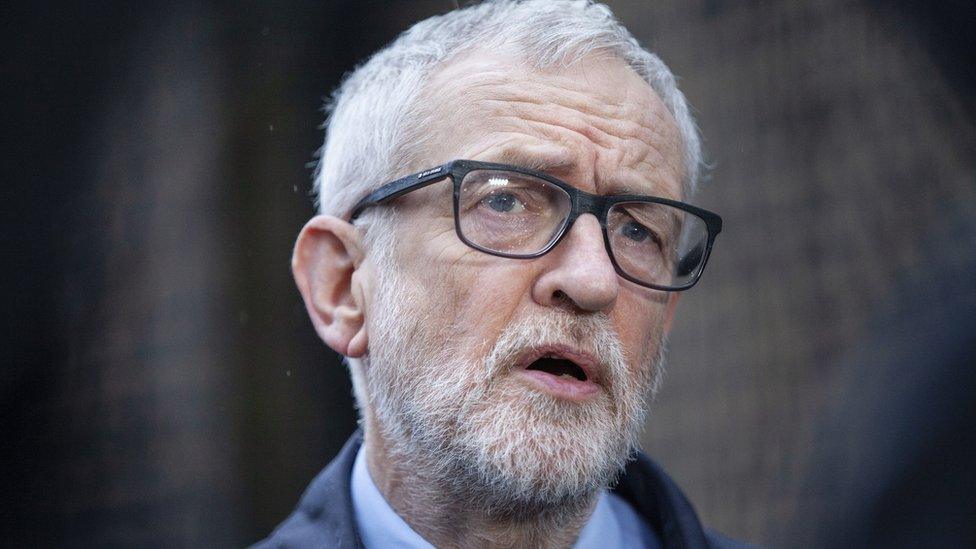Anti-Semitism: Labour ruling body meeting over Jeremy Corbyn suspension
- Published

Jeremy Corbyn was suspended by the Labour Party in October
Labour's ruling body is meeting to discuss Jeremy Corbyn's suspension.
Last month, a report from the UK's human rights watchdog (EHRC) said the party broke the law by failing to stamp out anti-Jewish racism in the party.
Responding to the report, the former leader said the scale of anti-Semitism had been "dramatically overstated" by his opponents, and he was suspended.
Sir Keir Starmer said those who think the issue had been "exaggerated" should "be nowhere near the Labour Party".
However, the decision to suspend Mr Corbyn was taken by the party's General Secretary David Evans, not the new leader.
A panel made up of members from the party's National Executive Committee (NEC) is now meeting to decide whether to take further disciplinary action or to lift his suspension.
Ahead of the meeting on Tuesday, Mr Corbyn - who has been a member of the party for 54 years - released a statement on Facebook, saying concerns over anti-Semitism within Labour are "neither exaggerated nor overstated".
But the Board of Deputies of British Jews said their community did not accept "this pathetic non-apology".
Rules brought in under Mr Corbyn mean NEC panels - made up of five members, advised by a barrister - look specifically at anti-Semitism cases on a monthly basis.
The can decide to either:
Take no further action
Issue a reminder of values - which is a less formal sanction
Issue a reminder of conduct - which is closer to a formal warning
Rule for a time-limited suspension
Rule for an expulsion
The panel can also refer any cases to the National Constitutional Committee, which is an elected body in the Labour Party that hears and decides on complaints.


The five members of Labour's ruling national executive who will decide Jeremy Corbyn's political fate have a tricky task.
Some of the former Labour leader's colleagues on the left of the party wanted him to apologise for his remarks, feeling this was the easiest route to having his suspension lifted.
Instead, Mr Corbyn issued a "clarification", making it clear he wasn't belittling concerns over anti-Semitism, and that he was referring to the scale of the problem being overstated, not its seriousness.
The Board of Deputies of British Jews has called this a "pathetic non-apology", so if he is reinstated, the party can expect the row over anti-Semitism to reignite.
If, however, further disciplinary action is taken, a section of the left will regard that as a declaration of civil war - something which those closest to Mr Corbyn hope to avoid.
After the damning EHRC report Labour wants to move on from the toxic issue of anti-Semitism - but is already finding that is easier said than done.

Mr Corbyn - who led the party for almost five years - said he had already given a statement to Labour to "clear up any confusion" about what he had meant when he responded to the publication of the Equality and Human Rights Commission's report.
He said the report's release "should have been a moment for the Labour Party to come together in a determination to address the shortcomings of the past and work as one to root out anti-Semitism in our own ranks and wider society".
Mr Corbyn, who is still an MP despite his suspension from the party, said it was "not his intention" to say anti-Jewish racism should be tolerated, and he "regrets the pain this issue has caused the Jewish community".
His statement added: "To be clear, concerns about anti-Semitism are neither 'exaggerated' nor 'overstated'.
"The point I wished to make was that the vast majority of Labour Party members were and remain committed anti-racists deeply opposed to anti-Semitism."
But the Board of Deputies of British Jews condemned the statement and called for action from Labour.
President of the organisation, Marie van der Zyl, added: "If the party wants to show it is serious about tackling anti-Jewish racism, it will consign this statement, just like the culture which led to the EHRC's damning findings, to the dustbin of history.
"To do otherwise would be a failure of leadership which would risk the party slipping backwards."
Asked about the statement, a Labour Party spokesman said they would not "give a running commentary on an individual case".
In comments before his suspension from Labour, Jeremy Corbyn said anti-Semitism complaints numbers were "exaggerated"
Labour has been plagued by allegations of anti-Jewish racism by some of its supporters since 2016, mostly on social media.
Anti-Semitic abuse is against the law and in May last year the EHRC - which polices human rights and equalities in the UK - launched an investigation into Labour's handling of complaints about the behaviour of some of its supporters.
When it published its report in October, the Commission put some of the blame on "serious failings" under Mr Corbyn's leadership of the party.
But Labour said it was his reaction to the report that led to his suspension, rather its findings.
Kier Starmer: "An ability to recognise the hurt, draw a line and move on"
Many Labour MPs stood by the decision to suspend Mr Corbyn, including Margaret Hodge, parliamentary chair of the Jewish Labour Movement.
But his allies in the Commons, including former shadow chancellor John McDonnell, called for the decision to be reversed.
On his Facebook post, the former leader said: "I hope this matter is resolved as quickly as possible, so that the party can work together to root out anti-Semitism and unite to oppose and defeat this deeply damaging Conservative government."